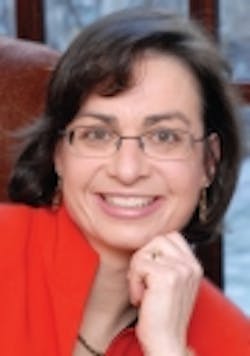Research for everyday use
Ann Eshenaur Spolarich, RDH, PhD, has developed a program called "Exploring the Emerging Science About Oral Disease and Systemic Disorders" that addresses these issues. Ann believes that dental hygienists are primary care providers, and that they share in the responsibility of remaining current with the latest research. Participants of Ann's program will be able to:
- Describe assessment risks for common oral diseases
- Identify evidence-based strategies to reduce the risk of oral and systemic disease
- Discuss current research regarding the oral-systemic disease link
Although primarily geared to hygienists, all members of the dental team would benefit from this program as it incorporates aspects of medicine throughout. The knowledge gained from the presentation translates into risk reduction strategies that clinicians can use in their daily practice to improve the overall health of their patients.
Ann provides materials in her program to facilitate learning for all participants. People often call her a "tree hater," because she offers extensive handouts that clinicians can use as chairside references. By providing these handouts, Ann allows her participants to do more extensive reading on their own for further education.
Ann has a certificate of dental hygiene from the University of Pennsylvania, a bachelor's degree in dental hygiene from Thomas Jefferson University, and both a master's of science in dental hygiene and a PhD in physiology from the University of Maryland. She started presenting continuing-education courses on periodontics and medical history considerations early in her career. She began, as most speakers do, presenting programs at local professional associations. She now lectures about 40 weeks per year both nationally and internationally to dentists and hygienists. Ann also teaches pharmacology and clinical medicine to dental and dental hygiene students.
Ann has been a practicing hygienist for 28 years and has worked in the private sector and in hospitals. For the past 15 years, she has dedicated her practice to geriatrics, where many of the greatest medical and dental challenges occur. Working with these medically compromised patients exposed her to a significant amount of knowledge from medicine, pharmacology, and research, which then motivated her to advance her own education in these areas. Ann loves sharing with other clinicians what she has learned from her clinical experiences and her perspectives as a trained scientist and researcher.
Ann is dedicated to helping dental hygienists become more educated, more informed, and more autonomous. She is concerned about trends in "dumbing down" of the profession, especially those efforts aimed at limiting education needed to enter dental hygiene practice. She is a graduate of a two-year program in dental hygiene where she earned only a certificate and not an associate's degree. It was an excellent program and Ann felt that she was well-prepared to practice at the time. However, she wasn't aware of things that she didn't know and still needed to learn.
She credits her mentors, her ongoing education, and personal experiences that opened her eyes to all that the profession can offer. Ann believes it takes a firm commitment to lifelong learning to advance ourselves professionally, both in a formal academic curriculum and through continuing education. Dental hygiene is the last of the allied health professions to allow entry-level clinicians without a baccalaureate degree. At a time when health-care concerns are at the forefront of our society and the push for interdisciplinary collaboration is growing, it is essential that the dental hygiene profession establish itself at a comparable level of education and expertise shared by other health professionals. Dental hygienists are enthusiastic, educated, and talented individuals; they need to be recognized as integral members in the health-care arena.
In her personal life, she is passionate about her husband, friends, and her love of cooking and the outdoors. She is active in her church and hosts fundraising events benefiting local charities in her community.
Ann's programs challenge the hygienist to look beyond a patient's medical history and see the link between the patient's systemic health and his or her oral health. As dental professionals, we are entrusted to care of our patients in a holistic manner, and Ann's programs elevate participants to do just that.
For more information on Ann's programs, contact her at [email protected].
Ann-Marie C. DePalma, RDH, MEd, FAADH, is a fellow of the American Academy of Dental Hygiene and a member of ADHA and other professional associations. Ann-Marie presents continuing-education programs for hygienists and dental team members and has written numerous articles on a variety of topics. She can be reached at [email protected].